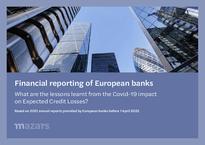
Financial reporting of European banks: benchmark study 2022
We have analysed the 2021 annual reports of 26 banks in 11 European countries to better understand the impact of Covid-19 on their expected credit losses and how it can help banks prepare as they face new challenges as a result of the war in Ukraine. This study is the fourth in its series and follows on our third edition of the report released in September 2021.
Discover our interactive report
A focus on Expected Credit Losses
The study mainly focuses on the ECL-related impacts and covers:
- ECL charge impact of YE 2021 on the profit or loss and ECL allowances;
- ECL allowances: changes in coverage ratios and allocation between stages;
- Post-model adjustments/overlays;
Other topics, incl. Non-Performing loans, green finance disclosures, significant increase in credit risk (SICR) criteria analysis, first review of banks’ exposure to Ukraine war and more.
In the following, our Senior Manager Heike Hartenberger provides a contextualisation of the report for the German market:
"After its baptism of fire, further tests await the financial mathematical concept of IFRS 9. The allowance for losses on loans is to be determined on the basis of historical data, taking into account expectations regarding future developments. Many long-term data banks are characterised by a positive trend in loan loss provisioning until the end of the last decade. In addition, the year 2021 represented a special year for many companies, a year with higher annual results and a provisioning charge that was not infrequently below that of years in positive trend. Quite a few companies had a provisioning gain in 2021, although, overlays and post-model adjustments continued to be an important measure for determining the allowance for loan losses.
A data basis characterised by a trend and the current geopolitical situation after the years of the pandemic have led to the fact that the models used by the companies to determine the risk provision itself can hardly estimate the risk development in accordance with the requirements of IFRS 9. In addition to the uncertainties still existing from the Covid 19 pandemic with regard to future developments, there are currently the geopolitical uncertainties associated with the Ukraine war. It is difficult to use historical data banks or experience as a basis to estimate future developments. The determination of macroeconomic scenarios is therefore of major importance."







